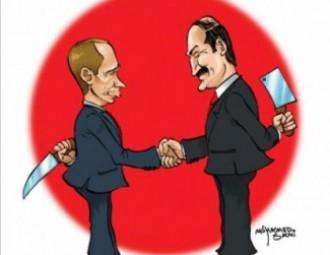Andrei Kazakevich: Dependence on Russia worsens Belarus’ development

During the 4th International Congress of Belarusian Studies the organizers are planning to discuss Belarusan situation in the political conflicts, which are under development in the Eastern Europe.
Call for sections, panels, round tables, presentations, workshops for the International Congress of Belarusian Studies, which will take place on 3-5 October 2014 in Kaunas, Lithuania, is now over. The organizers received more than 50 applications from the leaders of the academic community and separate groups, organizations and individuals, interested in certain fields of social sciences and humanities.
As a result, a draft list of thematic blocks and panels was made, according to which individual applications for participation in the Congress will be made before the deadline, assigned for June 2, 2014.
Andrei Kazakevich, the director of the Institute for Policy Studies Palіtychnaya Sphera (Political Sphere), told EuroBelarus Information Service about the main spheres and subject matters that are expected to be covered at the Congress.
This year the Organising Committee of the International Congress of Belarusian Studies has decided to give more attention to the problems in Central and Eastern Europe, as well as the relations of Belarus with its neighbors, to the problem of change in strategy that the large states in our region used to have. “This problem becomes urgent because of the changes in the overall political situation in the last six months, - Andrei Kazakevich believes. – We should also cover the topic of Russia-Europe relations, the situation in Crimea and in Ukraine in general”.
The director of the Institute Palіtychnaya Sphera assumes that we can’t avoid the discussion of situation in Belarus during the ongoing political conflicts in its neighboring countries, because the developments in the region have their consequences. “Belarus should decide on its priority of preserving independence and sovereignty. It is particularly connected with the unpredictable actions of Russia, which can signalize the possibility of Ukrainian scenario in Belarus, including the formation of diverse pro-Russian radical organizations and activation of their activity in separate regions, - he says. – We should make everything possible to avoid that”.
It is important that Belarus leaves Russia-Europe and Russia-US confrontation as soon as possible, improves its relations with Europe and United States. Dependence on Russia worsens Belarus’ development as an independent state”, - emphasizes the political scientist.
This year territorial and military conflicts at the post-Soviet area will be discussed at a specially assigned panel during the Congress.
Among other topics that will be discussed during the Congress are Local Institutions and Politics in Central and Eastern Europe, Belarusan history in the ancient times and in modern times, the problems of Belarusan toponymy, literary trends.
According to Andrei Kazakevich, the Organising Committee received several dozen applications for lectures, presentations and exhibitions; so the participants will have a full program.
The exact program will be announced soon; now the organizers are waiting for the individual applications for the Congress. Individual proposals are due by 2 June 2014.
About 400 scientists from 22 countries from all over the world are to take part in the following thematic blocks:
Economics
Problems of Innovative Development of Belarusian Industry
Problems of Transformation and Modernisation of Belarusian Economy
Economy of Belarusian Regions
Political Institutions, National Identity
Local Institutions and Politics in Central and Eastern Europe: the Results of (Un)Democratic Transformation
Political Opposition in the Countries of Former Soviet Union
National Identities in the Politics of Nations of Former Commonwealth (Rzeczpospolita)
International Relations and Foreign Policy
Emerging Powers and Central and Eastern Europe: Missed Opportunities or Overestimated Perspectives?
Armed Conflicts on the Post-Soviet Space in 1990-2014 (the Crimea, Abkhazia, Nagorno-Karabakh etc.)
Middle Europe in the Politics of Great Powers
Belarusian Foreign Policy
State, Civil Society, Science, Education
Current State, Opportunities and Prospects of Science, Education and Academic Community in Belarus
Public Administration and Public Policy in Belarus
Belarusian Civil Society: Current State and Future Prospects
Belarusian Society: Language and Transformation of Informational Space
Linguistic Projects as a Tool for Consolidation of Belarusian Society
Social Networks and Modernisation of Belarus
Twenty Years of Belarusian Internet (1994-2014): History and Social Evolution
History
Traditions of Szlachta Self-Government in the History of the Grand Duchy of Lithuania (to the 450th Anniversary of Belsk Privilige of 1 July 1564)
The Grand Duchy of Lithuania: From Source to Narration (Problems of Interpretation of Written Heritage)
Typography of Suprasľ and Belarusian Trade of Service Books
Belarus in the Russian Empire ( the End of the 18th – the Beginning of the 20th Centuries)
Violence in the 20th Century: Experience, Consequences, Memory and Heritage
History of Belarus of the 20th Century
Borderland and Borders: from Cartography to Literature
Jews in Belarusian History
Belarusian Diaspora: Trying to Understand the Intellectual Heritage
Belarusian Necropolis Studies
Belarusians in Poland: Past, Present and Future
Literature and Linguistics
Hermeneutical Potential of National Cultures and Multilingual Writing of the Great Duchy of Lithuania
Belarusian Literature: National Tradition and World Context
Literature after “Bum-Bam-Lit”: Art Groups in the End of the 20th – Beginning of the 21st Centuries
Belarusian Toponymy: Problems of Ordering and Standardisation
Belarusian Bible: Problems and Prospects of Academic Translation
Religious Studies
Saints in Belarusian History and Present: Personalities, Places, Texts, Community
Culture, Museums, Architecture, Art
Contemporary Belarusian Culture: Search for New Matrix or Life after Nation?
The Problem of Creation of Catalogue of Representative Works of Belarusian Art of the 20th – 21stCenturies
Management in the Contemporary Cultural Projects
Museums and Problems of Interpretation of Cultural Heritage
Contemporary Architecture of Belarus: Problems of Study and Prospects for Development
Tradition and Post-Tradition in the Cultural Landscape of Belarus
Bagpipes in the North-East Europe: History and Mutual Influence
Conservation and Restoration of Architectural Heritage
Gender Studies
Gender “Rules”: Discources, Policies and Practices
Study of Masculinity: Interdisciplinary Academic Field
-
03.01
-
07.10
-
22.09
-
17.08
-
12.08
-
30.09



























